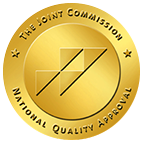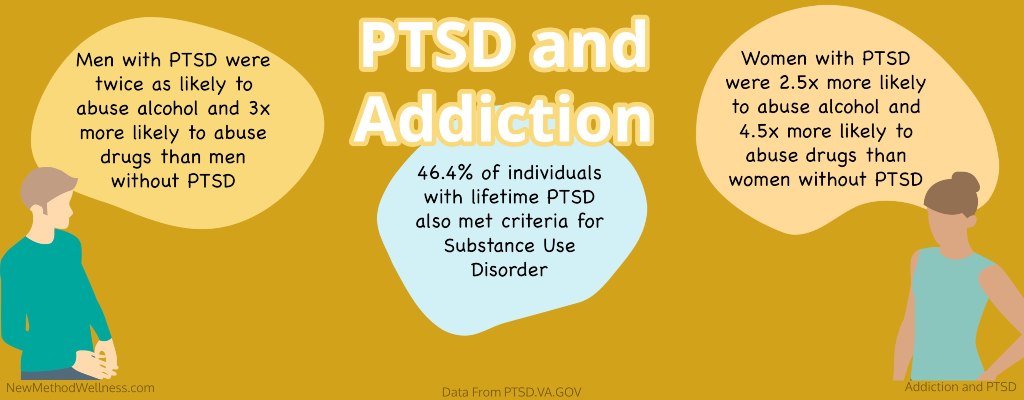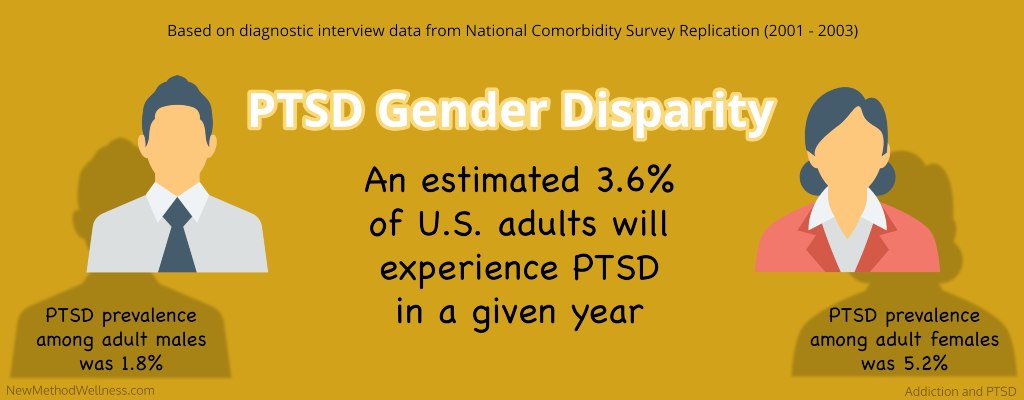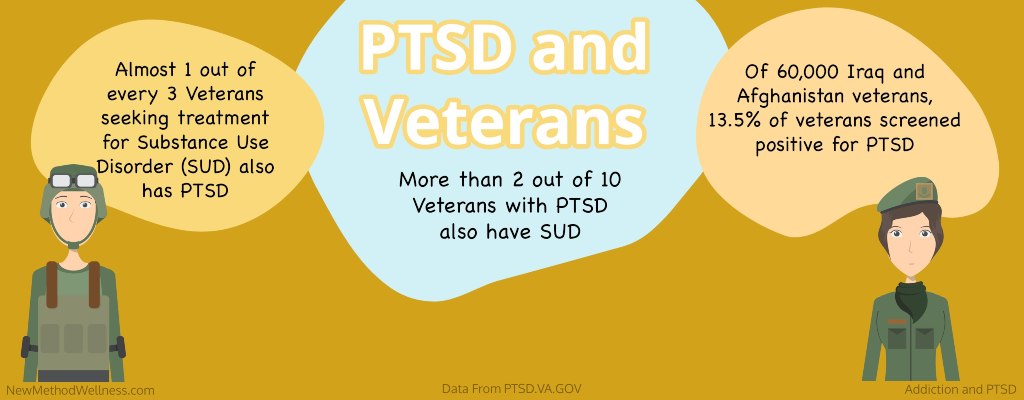
DUAL DIAGNOSIS: Addiction and PTSD


Table of Contents
Addiction and Post-Traumatic Stress Disorder
Post Traumatic Stress Disorder (PTSD) is a psychological disorder caused by being involved in a significant traumatic event. PTSD means that the sufferer has difficulty processing said traumatic event. They might experience a heightened sense of distress when they think about the incident, and they might have trouble handling situations that are similar.
Sadly it’s very common for PTSD to occur alongside some kind of substance use disorder. Unfortunately, having PTSD can exasperate the problems of dealing with addiction.
Unfortunately, many drug rehab programs simply address the drug addiction without dealing with the underlying trauma. This is a problem because PTSD is often the root cause of drug or alcohol addiction. Failing to address the symptoms of PTSD can put a recovering addict or alcoholic at a high risk of relapse.
The Symptoms of PTSD
There are four main symptoms that characterize PTSD. First, you might experience flashbacks. A flashback is when it feels like the traumatic event you experienced is happening again. Something might trigger you to think back to that moment, essentially tricking your brain into reliving the incident. For example, the sound of a car backfiring might trigger the PTSD of a gunshot victim.
The second symptom is intrusive thoughts. Intrusive thoughts are unwanted thoughts that pop into your mind. They can also recur with some regularity, making a person feel as if they are being haunted by this unintentional idea or feeling. Most people experience intrusive thoughts from time to time, but this experience can be much more intense with PTSD. With PTSD, you might keep repeating a traumatic event over and over again in your head.
The Third symptom is distress when being reminded of the trauma. Many people with PTSD need to avoid certain situations because certain things can trigger extreme anxiety. For example, a war veteran with PTSD might not watch war movies without feeling very stressed out.
Finally, people suffering from PTSD might also experience physical symptoms. For example, when reminded of their trauma, someone with PTSD may start sweating and feel nauseous. This is far from an exhaustive list, PTSD is a complex psychological condition that can present in many different ways among different people.
Diagnosing PTSD
Only a behavioral health professional can diagnose someone with Post-Traumatic Stress Disorder. This can be a Psychologist or a Psychiatrist. In order to meet the criteria and be clinically diagnosed with PTSD, a person must display symptoms for more than a month and the symptoms must negatively impact that person’s life.
According to the Diagnostic and Statistical Manual of Mental Disorders, 5th Edition (DSM-V), a person with PTSD will experience the following symptoms with this frequency during the course of a month:
At least One Re-experiencing Symptom
Re-experiencing symptoms can come from a person’s own thoughts or from an object or experience that reminds them of their trauma. These symptoms can include things like flashbacks or bad dreams.
At least One Avoidance Symptom
Avoidance symptoms occur when a person changes their personal routine in order to avoid the thoughts or feelings associated with their trauma. This can include staying away from people, places, or things related to a traumatic event.
At least Two Arousal and Reactivity Symptoms
Arousal symptoms include things like being easily startled, feeling tense, and having difficulty sleeping. These symptoms are usually ongoing and resemble a consistent bad mood where a person often feels angry and stressed out.
At least Two Cognition and Mood Symptoms
Cognition and Mood Symptoms most closely mirror the symptoms of Substance Use Disorder. When these feelings persist for a month or more after a traumatic event they are often signs of PTSD. These symptoms can include poor self-esteem, a negative outlook on life, feelings of guilt, and a lack of interest in enjoyable activities.
What Causes PTSD?
Any situation that causes a lot of stress has the potential to give you PTSD. The key takeaway here is that everyone is different and handles trauma differently. In the past, people speculated that PTSD was the result of cowardice, but we now know that to be false. In reality, pretty much anyone can develop PTSD.
According to statistics, around 17% of military veterans have some form of PTSD. PTSD is so prevalent in the military because fighting in wars is likely to expose you to traumatic situations. Of course, you don’t need to be in the military to be exposed to trauma. The victims of natural disasters and car crashes are also at risk for developing PTSD.
While a lot of people with PTSD have it from intense situations like firefights or tornados, it’s possible to get PTSD from something like a loved one dying. You don’t need to have experienced something firsthand to develop PTSD from it. From what we know about PTSD, it can happen to anyone. It can emerge in children, and people who have been through a physical or sexual assault, abuse, or other serious events. Women are more likely to develop PTSD than men, and some people may be genetically predisposed to developing it.
Experiencing PTSD isn’t a sign of weakness. Unfortunately, many PTSD sufferers are uninformed about their condition. Often this leads to them turning to drugs or alcohol to alleviate their symptoms.
What is Addiction?
Addiction is when someone is compelled to use a certain substance on a regular basis. Addicts become dependant on drugs or alcohol in order to function. People with addiction issues often find that they lose control of their lives. When you’re an addict, you’re only concerned with getting your next fix. This can lead to issues with your family and friends. Many addicts find themselves ostracized from their friends and family due to their actions. When addiction gets bad, addicts are not above stealing from friends or family to keep their high going.
When addiction gets too bad, a trip to rehab might be necessary. Certain substances can be dangerous to quit without medical supervision. For example, recovering alcoholics can suffer from seizures. With the right treatment, the chances of recovery from addiction are high. The key is finding a rehab center that takes the right approach.
Many addicts also have underlying psychological issues such as PTSD. In order to make a true recovery, both conditions need to be treated.
PTSD and Addiction
There is a clear link between PTSD and substance and alcohol use disorders. Sadly many people with PTSD are unable or unwilling to get the help they need to treat their condition. This might lead to them relying on drugs or alcohol. Often this is a form of self-medication. People with PTSD suffer from extreme stress, and certain substances can lessen the impact.
Not only can this kind of behavior lead to drug addiction, but it can also make the PTSD symptoms work. Relying on drugs or alcohol to alleviate the symptoms isn’t a long-term solution. The more you drink or get high to escape your problems, the harder it becomes to deal with them constructively.
Sadly, many people who suffer from PTSD address their addiction through a stay in rehab, but they don’t get the help they need for the PTSD. Without addressing the root cause of their addiction. Quite often, this leads to the cycle of addiction starting right back up again.
How Does PTSD Cause Addiction?
Many of the symptoms of PTSD lead the sufferer down the path of addiction. People with PTSD typically engage in avoidant behavior. They try to avoid any kind of experience that will remind them of the trauma they have suffered. Unfortunately, this might also extend to talking to friends and family about the event as well. Unfortunately, PTSD suffers have no way of avoiding their intrusive thoughts unless they turn to drugs or alcohol.
Sometimes people with PTSD will use dangerous amounts of drugs or alcohol to try and get their intrusive thoughts under control. Many addicts falsely believe that substance abuse is the only way to control their intrusive thoughts. PTSD can also lead to drug or alcohol addiction by causing difficulties with personal relationships. Sometimes, people with PTSD might become socially reclusive.
Humans are inherently social creatures. If we don’t get the chance to interact with other people, it can have a negative effect on our behavioral health. In the short term, you can make up for lack of social contact with alcohol or drug use. Sadly, this can quickly spiral out of control and into addiction. It’s important to realize that there are methods to dealing with intrusive thoughts that don’t involve relying on dangerous drugs or alcohol.
When treating addiction that occurs alongside PTSD, it’s clear that the PTSD symptoms need to be addressed before the addiction can be dealt with.
Treating PTSD and Addiction
If you suffer from both PTSD and drug or alcohol addiction, you can’t address one without the other. When treating these conditions, there needs to be a holistic approach.
It’s not enough to simply go through a detox program to get the drugs or alcohol out of your system. This needs to happen alongside psychiatric or psychological counseling. Cognitive-behavioral therapy or CBT is a therapy method that has great results in treating PTSD. Essentially, this therapy involves learning to restructure your thoughts.
When you’re successful in this kind of therapy, you’ll be able to control your intrusive thoughts more without needing to rely on drugs or alcohol. This helps you staying sober as it gives you a viable alternative to using drugs or alcohol.
It’s important that you attend a rehab center that will focus on your individual situation. Even when dealing with PTSD specifically, there’s no “one size fits all” strategy for dealing with the disorder. A good rehab center will look at your situation and come up with a treatment program that works for you.
Treatment Options
When it comes to picking a rehab center, you have two major choices. You can either pick inpatient rehab or outpatient rehab. Inpatient rehab is when you live full time at the rehab facility. This is the best choice if you have a serious drug addiction and require medical care round the clock.
At an inpatient rehab center, you essentially take a break from the outside world to focus on working on yourself. These facilities are often in remote areas, so you really get the sense. While inpatient rehab might be the most effective way of getting treatment, it’s also the most expensive. On top of that, not everyone has the ability to disappear from their responsibilities.
In that case, you might consider outpatient rehab. Outpatient rehab is when you continue to live in your own accommodation, and you make the trip to a rehab center for treatment. You might go once a week, or you might go 5 times a week. This is usually the best option if you’re looking to spend as little as possible or if you have unavoidable responsibilities at home. Outpatient rehab is also sometimes used to help the transition between inpatient rehab and wider society.
Don't Ignore PTSD
Many addicts who suffer from PTSD want to avoid talking about their trauma and simply focus on the addiction. It’s certainly possible to get clean from drugs or alcohol without having any therapy sessions. The trouble arises weeks or months later. Unfortunately, untreated PTSD means that relapse is much more likely. Without learning the proper psychological techniques to deal with PTSD, an ex-addict is likely to fall back on using drugs.
The only long-term solution is to get the right kind of help. You should see a therapist who will help you to understand your trauma. They’ll help you to develop positive and effective methods for dealing with your problems. Many people with PTSD feel like the person they were before the trauma was a different person. With the right treatment, you can become more like that person again.
Take the First Step
The key to dealing with both PTSD and addiction is to get the right kind of help. You need to be treated by an organization that helps you detox from drugs or alcohol.
That facility also needs to provide psychological counseling to help you deal with your PTSD symptoms. PTSD and addiction go hand in hand, so it’s vital that you don’t treat one without treating the other. While it might feel like you have no alternative but to use drugs or alcohol, you’ll find that therapy can make all the difference. Once you’ve addressed both of your conditions, you can take the next steps in improving your life.
This might involve reconciling with friends and family, or it might involve climbing the career ladder. Whatever your dreams or aspirations are for the future, it all depends on you taking that vital first step by getting the help you need.
Why We're One Best Dual Diagnosis Treatment Centers
Handpicked by Dr. Phil, New Method Wellness is a premier dual diagnosis addiction treatment center dually accredited by The Joint Commission. It has been singled out as one of the best drug and alcohol rehab centers in America, offering a unique 3:1 staff-to-client ratio that pairs every client with two therapists instead of one.
At New Method Wellness, we add another dimension to dual diagnosis treatment, and that is the integration of holistic therapy, such as massage/acupuncture therapy, equine therapy, and art therapy. As addiction therapists and substance abuse counselors work with clients to treat the substance use disorder and the co-occurring illness associated with it, holistic therapy adds meaning to life after treatment and sustains long-term recovery. Our 3:1 staff-to-client ratio ensures client success after treatment, as evidenced by our Extended Aftercare program.
For more information about New Method Wellness’s treatment programs, call (866) 951-1824
Related Topics
Clinically Reviewed By:
Deanna J. Crosby, M.A., LMFT, LAADC, Psy.D. (C)
Deanna Crosby is a Licensed Marriage and Family Therapist (LMFT) with over 20 years of experience working with clients in recovery. Her expertise has catapulted her into the spotlight. Featured on several episodes of the Dr. Phil Show as a behavioral health expert, DeAnna is a routine contributor for NBC News, The Huffington Post, Elle Magazine, MSN, Fox News, Yahoo, Glamour, Today, and several other prominent media outlets.
After receiving her bachelor’s degree from the University of California in Irvine, Crosby did postgraduate work at Centaur University where she graduated at the top of her class with a CAADAC certification in Centaur’s chemical dependency program. Following her time at Centaur, Crosby received her Master of Counseling Psychology degree from Pacifica Graduate Institute, where she also attained a Doctoral Degree in Depth Psychology.
TAKE THE FIRST STEP
From all of us at New Method Wellness co-occurring treatment center, we wish you peace and serenity in knowing that you or your loved one will get the necessary help.
ACCREDITED BY:





